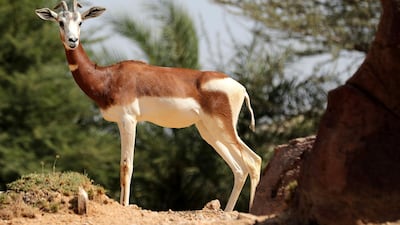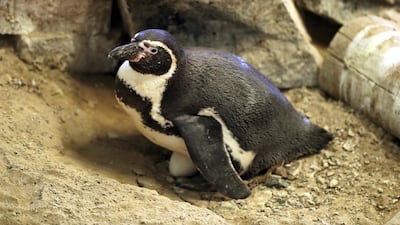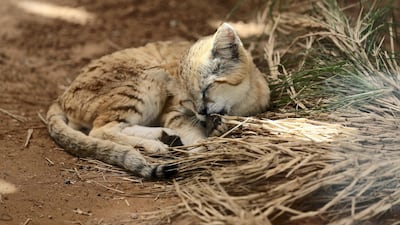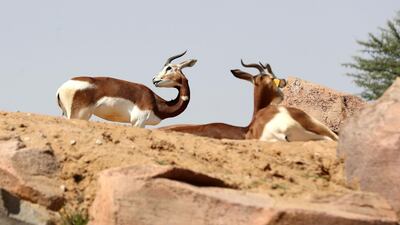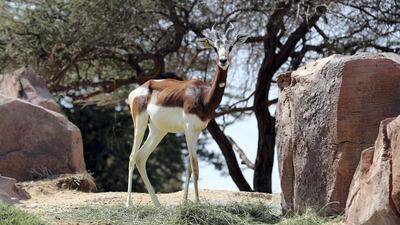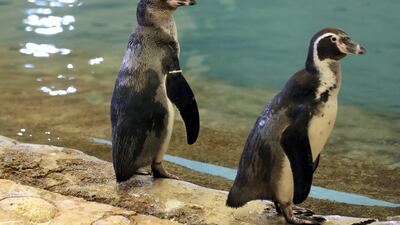Animal-identification software using skin and facial-recognition technology is being tested at Al Ain Zoo to help conserve vulnerable species.
Thousands of photos of the zoo's collections of rare Arabian sand cats, Humboldt penguins and Dama gazelle have been taken to be fed into a new artificial intelligence-powered recognition programme.
The software allows zookeepers to take a mobile-phone photo of an animal that can then be paired with existing information within a zoo database.
The system will help keepers determine which animals are suitable for breeding, or which may be displaying signs of illness or behavioural change.
“We are prioritising these three flagship species as they are critically endangered in the world,” said Myyas Al Qarqaz, a former field researcher who is now the zoo’s general curator.
“Hopefully, this artificial intelligence programme will help us manage these animals in the zoo on a day-to-day basis.
“The process will be quicker than trying to catch each animal to check on them whenever zookeepers notice a problem.
“It will help us study the genetics to see how we can improve their management future, bearing in mind the huge decline in their numbers.”
Al Ain Zoo has the largest collection of captive-bred Arabian sand cats in the world.
At only 30 it may seem small, but the elusive cats are becoming rare across the Arabian peninsula because of habitat loss and rapid urbanisation.
Arabian sand cats can be hard to spot, with fur-covered paws leaving few tracks behind.
Slightly smaller than a domestic cat, they are diminutive enough to hide in the tightest corner, while their sandy colouring provides ideal camouflage in the open desert.
Originating from Chad and Sudan in sub-Saharan Africa, the Dama gazelle is also critically endangered, with fewer than 100 remaining in the wild.
There are more than 80 at Al Ain Zoo and their faces and skin colourings will all be entered into the software's database.
Humboldt penguins are found in South America, but their numbers are also dwindling with fewer than 12,000 breeding pairs thought to exist in the wilds of Peru and Chile.
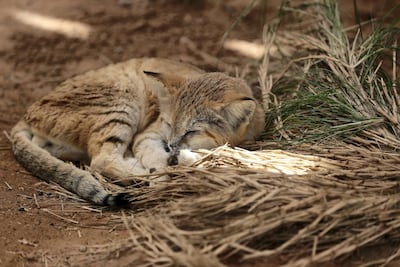
“If this is successful we are looking to implement this for all other species we have,” said Mr Al Qarqaz.
“This is a pioneering project that could be beneficial for other zoos in the region. Conservation is a huge part of our thinking.
“It is our main core value. We want to change the perception of zoos and what has happened in the past.”
Information on animals in captivity around the world is already shared through the Zoological Information Management System (Zims).
The format under exclusive testing in Al Ain will create a digital profile for every animal by taking a hundred or so photos of each.
The software will recognise the image as an ID for that specific animal. Their history, age, sex and all other relevant information can then be accessed on the animal’s zoological profile.
Automated messages will also be sent to the husbandry team when there may be a problem, or if the animal is due a certain treatment or check-up.
By mapping each animal’s genetic characteristics and history, it is hoped further successful breeding can be encouraged.
“The AI systems can monitor the animal’s data, medical conditions, welfare needs accurately and easily,” said Ahmed Karama Al Ameri, the zoo’s director of information technology.
“This will avoid the challenges we used to face while using the traditional methods, which rely on installing sensors that are subject to damage or loss.”
The zoo has signed partnership agreements with the Abu Dhabi Digital Authority, responsible for developing the digital system of the Abu Dhabi Government, and IBM.
“So far, our accuracy rate is about 89 per cent, so we will do more work to perfect it,” said Mr Al Ameri.
“Each of these three species is a strategic goal for the zoological and aquarium conservation and breeding programme.
“If this is successful, the software could be sold to other zoos.”

